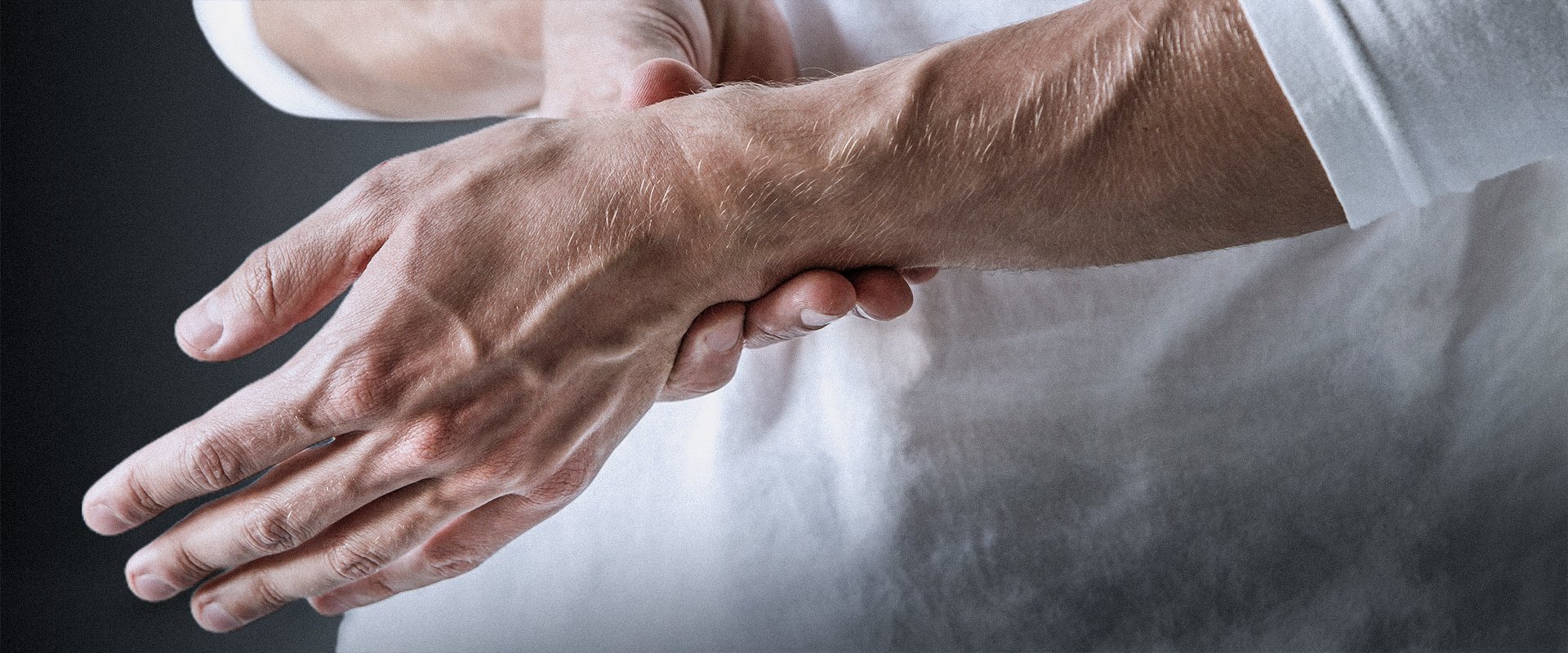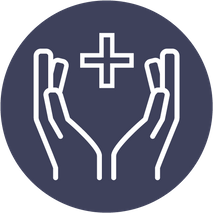
Physical Therapy for De Quervain's Tenosynovitis
AT EVOLVE
Physical Therapy for De Quervain's Tenosynovitis
HOW CAN PHYSICAL THERAPY HELP TREAT DE QUERVAIN’S TENOSYNOVITIS?
While the name may sound intimidating, De Quervain’s tenosynovitis refers simply to a swelling and constriction of the tendons that run along the thumb side of the wrist. This condition causes pain and discomfort in this area that can occur with movement of the wrist and thumb. Physical therapists address many of the common underlying causes of De Quervain’s tenosynovitis as well as impairments in strength, range of motion and functional use of the hand that can occur as a result of this condition.
WHAT DOES PHYSICAL THERAPY FOR DE QUERVAIN’S LOOK LIKE?
Like with all conditions, we will begin with an initial evaluation to better understand the pattern of symptoms you are experiencing as well as your goals and needs. We will ask you about the activities within your life that are being impacted by these symptoms as well as about your health history. We can then develop an individualized treatment plan based on your needs and the best evidenced-based techniques for the management of De Quervain’s tenosynovitis. Your treatment program may involve hands-on manual therapy techniques performed by your therapist as well as movements, activity modifications and exercises performed by you in the clinic and at home.
WHAT IS DE QUERVAIN’S TENOSYNOVITIS?
De Quervain’s tenosynovitis was named after the swiss surgeon Fritz de Quervain who first described the condition in 1895. This condition involves the tendons of two important muscles of the thumb–the abductor pollicis longus and the extensor pollicis brevis–which move the thumb away from the index finger and help to straighten the joints of the thumb. The tendons, which connect the muscle belly to the bone, are covered with a slippery sheath called the synovium. Normally the tendons move freely within this synovium and receive nutrients from it. De Quervain’s tenosynovitis describes a condition in which swelling of the tendons or thickening of the synovial sheath causes friction and rubbing of the abductor pollicis longus and extensor pollicis brevis tendons with movement of the thumb and wrist.
Symptoms of De Quervain’s tenosynovitis include:
- Pain, swelling and tenderness at the wrist near the base of the thumb
- Pain or weakness when pinching objects between the thumb and fingers
- Pain or discomfort when bending or twisting the wrist
- Weakness or discomfort when gripping and turning items such as when opening a jar or using a hammer
- A feeling of stiffness in the thumb where it meets the wrist
- A snapping or catching sensation when you move the thumb
- Localized swelling or a fluid-filled cyst may develop at the wrist near the base of the thumb
WHO IS MOST LIKELY TO DEVELOP DE QUERVAIN’S TENOSYNOVITIS?
This condition is fairly common and often considered to be an overuse condition caused by repeated movements of the thumb and wrist. Pregnant individuals and parents who are breastfeeding or cocking their wrist to support an infant or repeatedly lifting their child are more likely to develop these symptoms. Other repetitive tasks involving the wrist and thumb like gaming or tennis can also contribute to this condition. Women tend to be affected by De Quervain’s more often than men and we most likely see this condition in middle-age adults from 40-50 years old. Another risk factor for developing this condition is the presence of other inflammatory conditions like rheumatoid arthritis.
Call to Schedule a Consultation! 1-718-258-3300
End Injury Progression
Physical therapy for De Quervain's Tenosynovitis has proven to prevent injury, slow and even stop pain issues, improve performance, and reverse injury progression in many cases.
Relieve Pain
The movements used in this technique can target your entire body helping you to manage discomfort and pain during the course of your physical therapy treatments.
Improve Range of Motion
Posture awareness is an important area to focus on due to the fact that certain positions may cause you further discomfort and pain.
Restore Mobility
You can regain mobility and flexibility by taking part in the stretches and exercises as prescribed by your physical therapist.
How Long Will Physical Therapy for De Quervain's Tenosynovitis Last?
If you decide to work with a physical therapist to help with De Quervain’s tenosynovitis related issues, your entire treatment plan could consist of around 8-20+ different physical therapy sessions that will each last 60-90 minutes. Once you complete your customized physical therapy treatment plan, you will be able to continue to do the prescribed stretches and exercises utilized during your PT sessions yet in the comfort of your own home.
Looking for the cause of an injury
While full recovery and return to play is the ultimate goal when it comes to injury rehabilitation, a physical therapist has much more to offer. We are interested in identifying the factors that may have predisposed you to the injury in the first place so that we can make a plan to address them. This helps decrease your risk for future injury. Here are some factors that we look for when assessing a player:
- Muscle strength, power and endurance
- Flexibility and mobility in muscles and joints
- Sleep, nutrition and recovery time
- Training schedule
- History of prior injury
- The physical demands of a player’s position on the team
While some injuries are unavoidable, there may be times when internal and external factors play a role. Identifying these factors allows us to address them with a good physical therapy program or give advice on beneficial modifications to your training.
Movement and Performance Analyses
Over many years of studying the game of football, experts have determined the skills and components necessary for optimal performance. Being able to perform at your best requires that your body has enough strength, power, endurance, flexibility, etc. to not only perform your role on the field but also to manage the high training volumes on the field and in the training room. As movement experts, your physical therapist can assess your form with common training exercises like deadlifts, squats, plyometrics or running and give you insight on how to optimize the movements to enhance effectiveness and also decrease injury risk. Similarly, they can analyze common movement patterns utilized during play and determine if there are areas of weakness or impairments that should be addressed through a comprehensive training program.
So, if you are a football player who has never had an opportunity to work with a physical therapist we hope you can now see the many benefits of doing so. We want to work alongside your coaches, athletic trainers and family members to support your goals and dreams of excelling in football. Give us a call today to learn more about how we can help you take your athletic endeavors to the next level.
If you are dealing with a disc herniation and are ready to find a long-lasting solution to your pain call us today to learn more about our services and schedule an evaluation Call to Schedule a Consultation! 1-718-258-3300
Mill Basin (located in Harbor Fitness)
6161 Strickland Ave
Brooklyn, NY 11234
Monday: 7am-8pm
Tuesday: 7am-8pm
Wednesday: 8am-5pm
Thursday: 7am-8pm
Friday: 8am-1pm
Park Slope (located in Harbor Fitness)
550 5th Ave.
Brooklyn, NY 11215
Monday: 9am-8pm
Tuesday: 8am-6pm
Wednesday: 9am-8pm
Thursday: 8am-6pm
Friday: 8am-3pm
Gravesend
372 Avenue U
Brooklyn, NY 11223
Monday-Thursday: 8am-8pm
Friday: 8am-3pm
Ready to take the next step to a healthier you?
Contact Us Today!
PHYSICAL THERAPY FOR DE QUERVAIN’S !
Need physical therapy for De Quervain's Tenosynovitis?
Let our caring and compassionate physical therapists help you with relieving pain while getting you back on your feet comfortably.
Call now to schedule your first PT consultation free of charge.
Call: 1-718-258-3300







